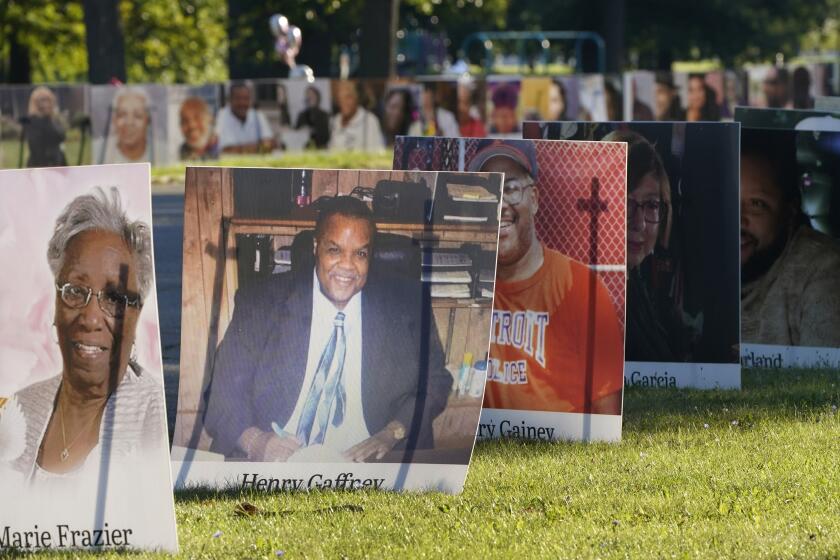Unpacking the many twists of HBO Max’s noir thriller ‘No Sudden Move’
Warning: The following article includes plot details from the entirety of the HBO Max movie “No Sudden Move.” If you haven’t seen the film yet, we suggest reading this review or this story on how the film came together instead. Then come back after you’ve seen the movie.
For a movie called “No Sudden Move,” Steven Soderbergh’s new noir thriller does a whole lot of abrupt zigging and zagging.
Keeping track of all the double- and triple-crosses among the large cast of characters in the labyrinthine heist film, now streaming on HBO Max, requires close attention.
Even then you still might find yourself getting a little lost at times in the ever-expanding web of deceit and corruption in which the film’s pair of petty criminals, Curtis Goynes (Don Cheadle) and Ronald Russo (Benicio del Toro), find themselves.
If you do, don’t feel bad. Soderbergh and screenwriter Ed Solomon planned it that way from the start.
“In our first meeting, Steven said, ‘Let’s do a film where you sometimes don’t find out anything about a character until way later, where you don’t learn backstory until you need to,’” says Solomon. “As an audience member, I like having to lean in, to fill in the gaps. I think there’s more poetry that way.”
In director Steven Sodebergh’s 1950s Detroit-set thriller, starring a well-matched Don Cheadle and Benicio Del Toro, automobiles play a leading role.
After being brought together with another petty crook (Kieran Culkin) to steal a document from the office of a low-level auto-industry executive, Goynes and Russo go on a twisty journey through racially polarized 1954 Detroit to find out who hired them for the job and why, navigating a perilous path between rival gangs and entrenched corporate interests.
For much of the film, neither they nor the audience even know what the document is — a familiar trope of the noir genre, which often employs this sort of MacGuffin as a springboard for the action.
In the film’s last act, the full dimensions of the scheme finally come into focus, and what appeared at first to be the story of a minor heist gone wrong is revealed to be a sprawling tale of power, systemic racism and corporate greed.
The document Goynes and Russo have pilfered contains plans for a catalytic converter, an innovation that will enable cars to emit less pollution. The major automakers — led by a shadowy Mr. Big played, in an unbilled cameo, by Matt Damon — orchestrated the theft of the blueprints to try to keep them from falling into the wrong hands.
Before the end credits, text rolls on the screen explaining that years later the government sued the major auto manufacturers for conspiring to conceal evidence of pollution from cars and deliberately holding back catalytic converter technology.
If that’s true, you might wonder, did everything we just saw really happen?
Well, no. The Justice Department did indeed come down on the Big Four auto manufacturers for conspiring from 1953 to 1969 to delay the manufacturing and installation of devices to control pollution in their cars. But the rest is fiction.
Steven Soderbergh and the stars of the new HBO Max noir thriller ‘No Sudden Move’ on the twisty narrative and shooting in the middle of a pandemic.
“There are some distant parallels to real people, and the references to things like the Purple Gang and various other elements of Detroit are real,” says Solomon, who did extensive research and consulted with experts on that period of the Motor City’s history. “But Don and Benicio’s characters are completely fictional. It’s not based on a true story but the backdrop contains real events.”
Another all-too-real element of that backdrop involves the destruction in that time period of Detroit’s once-thriving Black middle-class neighborhoods of Black Bottom and Paradise Valley, which is referenced in the film and lends Cheadle’s character an added moral weight.
“That whole area of town, Black Bottom and Paradise Valley, they just destroyed it,” Soderbergh says. “They just ran these multilane freeways right through. The before-and-after pictures are deeply enraging.”
Shooting in Detroit, the scars from that dark chapter in the city’s racial history were inescapable, says Cheadle.
“I remember when we got to Detroit, leaving the main road and dipping off into a neighborhood and seeing a pack of dogs just in the middle of the street,” he says. “These homes where there had been multigenerational families that were prospering — that was just gone. In some of the areas where we shot, every fourth house would have someone in it and the rest was just devastation and blight.”
The city of Detroit has turned an island park into an extraordinary memorial garden for victims of COVID-19.
As the fictionalized embodiment of corporate-fatcat avarice, Damon delivers some of the film’s juiciest lines, coldly boasting of his capacity for generating ever-greater wealth: “It’s like a lizard’s tail. I work, it grows. I sleep, it grows.”
Solomon knew he needed to nail Damon’s big monologue if the film was going to have the thematic heft he and Soderbergh wanted.
“I didn’t know who the actor would be but I knew it would be a great actor who’d be coming in for a few days,” he says. “The bar Steven set was a pretty high one. It was not a small task to think about and then write a scene worthy of an actor like that.”
As for the final fates of Goynes and Russo, there too things don’t turn out as one might perhaps have expected.
Russo is betrayed and killed by the femme fatale of a mob wife (played by Julia Fox) with whom he’s been having an affair. Goynes loses out on the big score he was hoping for but is given a reprieve by Bill Duke’s gang leader Aldrick Watkins so he can leave Detroit for a new life in Kansas City.
There is no happy ending for these two small-time crooks, no resolution in which they become buddies and beat the system. In the end, as in the beginning, they are filled with mistrust of each other and everyone around them, mistrust that is clearly justified in the murky noir world that Soderbergh and Solomon have created.
“No Sudden Move” is, after all, a noir film. As its tag line says, “Trust is a setup.”
“We didn’t want to fall for that trope that either of them learns something great,” Soderbergh says. “There was no universe in which I was going have a scene where somebody expresses some kind of evolution or enlightenment. The understanding that they come to is that they need each other. But that’s different. Need has nothing to do with want or or desire. Need is a primal, naked thing.”
More to Read
Only good movies
Get the Indie Focus newsletter, Mark Olsen's weekly guide to the world of cinema.
You may occasionally receive promotional content from the Los Angeles Times.









